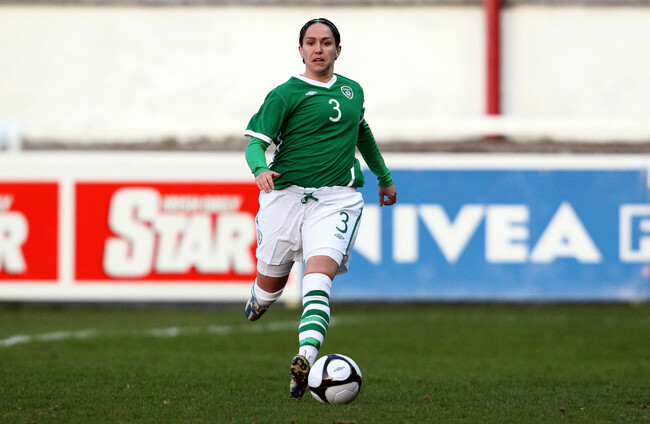IN LATE FEBRUARY, Ciara McCormack sat down at her laptop and started typing.
She’d blogged for over a decade, the life of a pro soccer player providing some pretty good material down through the years. There were her stints in far-flung locations in Norway and Australia, her Republic of Ireland caps, memories of the lessons learned while on a scholarship at Yale and wider rumination on retirement and coaching.
But this post was different. She’d written it many times before but always fell short of publishing it. She spent hours researching and piecing everything together. This time, she just felt compelled to send it out into the world.
Click.
And it was done.
She went out for some fresh air. And some cookies.
“I was standing in the checkout line at Whole Foods,” she tells The42.
“There was a girl behind me, kind of looking at me. She said, ‘Are you Ciara McCormack?’ And we got chatting. She was about ten years younger than me and had played on the Canadian youth teams and provincial teams. We had a bunch of mutual friends and were connected on Facebook and all of that stuff. And I said to her, ‘This is so weird running into you because I just wrote this blog post about Bob Birarda – did he ever coach you?’ And she just started to tear up. And she said, ‘Ciara, I’ve been in therapy for the last couple of years because of that guy.’”
McCormack, a native of Vancouver but whose parents are both from Ireland, titled the blog post ‘A Horrific Canadian Soccer Story – The Story Nobody Wants To Listen To But Everyone Needs To Hear’. Its publication has had a seismic impact.
The details are staggering and offer a damning indictment of both the Vancouver Whitecaps organisation and Canada Soccer, the national governing body.
“I’d not been in that Whole Foods for six weeks,” McCormack says.
“This girl I met never shopped there before. I’m a big believer that things happen for a reason and it just felt like a sign, like I needed to do this. Whatever happens next is supposed to happen. And that kind of pushed me over the edge.”
McCormack had known Birarda since she was in high school and by 2007, he was a highly-regarded and influential figure juggling three different high-profile roles: head coach of Canada’s U20 women’s team, head coach of the Whitecaps’ women’s team and an assistant coaching job with the senior Canadian women’s side.
At the time, McCormack, a gifted and experienced player, was playing with the Whitecaps – seen as a crucial stepping stone towards involvement with the national team – and thoroughly enjoying Birarda’s training. But, she alleges in the blog that Birarda’s coaching ascent led to a substantial shift in atmosphere. He became more threatening, bullying, intimidating and anyone who spoke up was reminded that he had control over how much or how little they played. Team members were fearful of losing game time and, on a wider scale, the chance to represent their country. After all, he was an integral part of the pathway.
As the issues lingered, McCormack and a team-mate who’d been particularly affected by Birarda’s behaviour, sought the counsel of the Whitecaps’ president and Canadian soccer icon Bob Lenarduzzi. After meeting and detailing everything in confidence, Lenarduzzi later called McCormack to say he’d spoken to Birarda and told him about the entire conversation. McCormack was stunned. How could he have been so flippant about confidentiality? How could he have been been so short-sighted about the vulnerability of both players? Eventually, McCormack signed with a team in Ottawa. Her team-mate stayed put and, despite having previously been first-choice, hardly played again under Birarda, drifting away from the game completely not long afterwards. McCormack, who had been training with the Canadian national team, never got another invitation to return.
With hindsight, the entire episode highlighted two important things: Birarda’s increased inappropriateness and the Whitecaps’ lack of awareness regarding player welfare protocol.
And inevitably, things got worse.
In preparation for the U20 World Cup in 2008, the entire Canadian women’s squad lived in an apartment complex in Vancouver for months. Incredibly, Birarda – who lived in a suburb of the city – was also given an apartment in the same building. McCormack, by that stage living and playing abroad, was consistently updated. The bullying intensified but now there were descriptions of sexually-charged text messages too and allegations of various sexually-charged interactions with players, some underage.
But just weeks before the World Cup, Birarda suddenly left both the Canadian national team and the Whitecaps, the departure officially described in statements at the time as being ‘in the best interests of both parties’. No further explanation was given.
Until McCormack published her blog post.
“I’ve been carrying this for 11 years and part of finally doing it is probably maturity, realising I had written it so many times and how it’s something that still really upset me,” she says.
“I felt it needed to be spoken about and that we had been silenced. There’s more of a climate now. Last summer, I sat there for four hours just crying, listening to the victim impact statements in the Larry Nasser case. So much of what the girls were saying resonated in terms of the type of environment. That kind of shook me. Then CBC (Canada’s national broadcaster) did a big story on sexual abuse in Canadian sport and that was the final trigger for me in terms of people possibly recognising this and maybe there being a chance this would be heard. I was on The National – our big news show – and I asked questions of the panelists, these so-called experts from various sporting associations who were so sub-par. It angered me and I was like, ‘Are they apathetic? Do they just not know?’ And that’s what made me angry and I think I’m the most articulate when I’m angry.”
McCormack’s allegations were quickly backed up by a collection of 13 other players who played for Birarda in 2007/2008. The majority of the group played for both the Canadian U20 side and the Vancouver Whitecaps and they levelled more allegations against Birarda, including:
- How one player witnessed him rubbing another player’s thigh while in a car
- How Birarda summoned a player to his hotel room for a one-on-one conversation, shut the door behind her and asked ‘What are you going to do about it’ regarding her non-starting status
- How he sent sexually suggestive texts to a player
- How he arranged one-on-one meetings with a player, sought validation on his appearance and personality and later wanted the player to meet him privately in his apartment. When the player felt it was inappropriate and stopped responding to texts, he froze her out at team meetings, training and games.
- How he sent messages to a player of a sexual nature. During a game, he told her how good her body looked in a wet white jersey and how he’d specifically decided the team would wear it for that reason
Last month, Andrea Neil – a deeply respected and legendary figure who played for Canada in four Women’s World Cup tournaments – came forward and revealed that in 2008, shortly after retiring, she first heard rumours about Birarda. She passed on her concerns to a coach within Canada Soccer and she was involved in the subsequent investigation that resulted in Birarda’s exit.
The internal investigation in 2008 was handled by a lawyer based in Vancouver named Anne Chopra. According to Neil’s testimony, Chopra told her she would be recommending to Canada Soccer and the Vancouver Whitecaps that Birarda avoid coaching in the future.
Up until the end of February this year, Birarda was a coach at Coastal FC, a club based about 45 minutes outside Vancouver. He was responsible for underage girls’ teams for close to a decade. Before that, he oversaw the U15 girls team at Tsawwassen Soccer Club, another team based on the outskirts of the city.
McCormack was stunned when she found out.
“It was mind-blowing,” she says.
It felt like a big middle finger to all of us. Just the audacity of it. And it’s representative of the culture here: the organisations run things, they bully and do whatever they want. The players are little specks that don’t matter at all. He has been on an elite level pathway for girls to get to the youth national team for the last 10 years. Canada Soccer are going around the country talking about player safety and you have this guy who is still front and centre. We were speechless. This guy who caused so much carnage.”
“He’s just been suspended by his club. In theory, he could go to another club tomorrow and coach. Canada Soccer is in charge of the coaching licences and they haven’t pulled his. If his club lifts his suspension tomorrow, he just goes right back on the field. That part hasn’t been redressed either. That’s extremely disturbing.”
Canada Soccer and Vancouver Whitecaps have issued statements that sidestep many of the issues raised by former players.
Both organisations have effectively alluded to the internal investigation in 2008 and Birarda’s subsequent removal as a ‘case closed’ situation. But the investigation has come under scrutiny from McCormack and Neil, as well as the group of U20 players who claim hardly any of those directly involved were actually interviewed and that despite some of the squad being underage, no parents were informed of developments either. There’s also the terminology used by Canada Soccer and the Whitecaps regarding Birarda’s departure. If he was removed because of inappropriate behaviour, including sexually-charged interactions with players – some of them minors, how could both organisations morally hide behind the carefully-crafted vagueness of his removal?
“If he (Birarda) is not hired because of ‘rumours’ then there’s discrimination and he can cite that – it’s horrific,” McCormack says.
“But another example of vulnerability. It’s not even about an organisation having certain policies in place. It’s just about having decent human beings that do the right thing and protect people and genuinely seem like they give a shit in those situations. It’s horrifying that they displayed such a complete lack of care towards players’ wellbeing consistently over the last decade. And the same people are still in charge. Even the statements they’ve been making…it’s like this bully mentality – ‘we’re not answerable to anybody’. Like, people’s lives have been destroyed because of this. It has taken away soccer careers. People are in therapy because of it.”
I got a hold of one of my former team-mates – an old room-mate – and I hadn’t spoken to her in 10 years. I messaged her to see if she knew what was going on and she asked me to call her. She told me she’d been crying all morning. She told me her story of what happened and that she’d totally repressed everything. She talked about it to a few people close to her when it happened but she quit soccer soon after it. She said it had brought up a lot of repressed stuff that she hadn’t dealt with because the elite athlete culture is to power through stuff and just keep going. It’s been brushed under the rug but now it’s reaffirming to all of us that we’re not crazy and that what happened to us was so wrong. We’re all dealing with this, looking at how we were so vulnerable, how our passion for the sport was used as a weapon against us, that if we were brave enough to speak up we lost opportunities in our own playing careers. Personally, I’ve been spontaneously crying a lot over the last month. Other women who are part of this group have said the same thing. Just being heard now has started the healing process for a lot of us. It’s been a very emotional time to be going back and revisiting painful memories.”
The Whitecaps have made some curious additional comments.
They’ve said that Chopra (referenced in their communication as the ‘Ombudsperson’) had no recommendations to make after completing her investigation in 2008, which contradicts the very specific claims made by Neil in her statement.
The Whitecaps have also revealed that they’ve contacted the Vancouver Police Department this month after becoming concerned about potentially fresh information that wasn’t uncovered in 2008.
Both developments cast an extremely long shadow on the finer details of the original investigation.
According to CBC’s Karin Larsen, Chopra signed a non-disclosure agreement with the Whitecaps and Canada Soccer so she can’t disclose the report’s findings. She did say that her role was to investigate and present the facts. And she also maintains that she never made any recommendations regarding Birarda.
“It was a total sham investigation,” McCormack says.
“If there was a report, we’re the ones who participated in the ‘investigation’ so we should have access to that. And they’re not sharing it with us. What they’re holding onto is that there was an investigation, there were no recommendations and that’s why they all moved on.”
At various moments throughout our conversation, McCormack’s voice cracks. She also spoke with Chopra as part of the 2008 investigation and detailed everything she included in her blog post 11 years later. While it was taking place, Birarda was coaching the players ahead of the pending World Cup. But, he caught wind of the enquiry and pulled some aside at training to grill them on what they knew about it. Players were terrified. In a climate of fear, the message was simple: you know the consequences of talking.
“He was let go six weeks before they went to a World Cup,” McCormack says.
Obviously, something serious happened, the fact that such strong action was taken. To allow him go back on a field with teenage girls again just two months later…Actions speak a hell of a lot louder than words and it shows they couldn’t give two craps about the kids whatsoever and it’s more about covering up and protecting their reputation. To have the power to ensure he doesn’t return to a pitch and then allowing him right back in, in front of everybody. It’s not like he’s been in a small town where nobody knew. He’s on an elite pathway. He’s front and centre. I can’t even fathom it.”
“Canada Soccer controls the coaching licences. If he wasn’t good enough to coach for their organisation, why allow him go back into the community? It’s wilful disregard for player safety. You liken it to the Catholic Church. I’m sure every mother and father of a 13 or 14 year-old would want to know of any misconduct that resulted in a coach being ‘let go’ from a previous job.”
In Vancouver, there was a telling development earlier this week.
In the 35th minute of Wednesday night’s Major League Soccer game between the Whitecaps and Los Angeles FC at BC Place, two influential fan groups, the Southsiders and Curva Collective, staged a walkout protest and gathered in the concourse instead. Some LAFC fans did likewise.
It was to support the women at the centre of this story.
A story that – unfortunately for Canada Soccer and the Vancouver Whitecaps – shows no signs of going away.
“It’s just the arrogance of these organisations,” McCormack says.
They think they can just put these BS statements out there and we’re all supposed to walk away. But we’re knee-deep in this now. It’s not even about us. We’re going to fight hard to make sure the next generation of kids never have to experience anything like this. The irony is that the World Cup starts in two months and the age-group involved in this story would be at their peak right now if they hadn’t gone through this. At the U20 level there were some really good players who stepped aside. Eden Hingwing quit two months before the 2008 World Cup because she didn’t want to be part of this inappropriate, sexual environment. From a soccer perspective, it changed the makeup of the World Cup team playing this summer. Players who spoke up lost opportunities. There was a soccer cost. And a very high emotional cost.”
“But the big lesson for me is that speaking up, doing the right thing and standing up for people is way more important than any athletic accomplishment. Sport gets so idealised. People who never made it on a big stage have acted with such bravery and courage throughout this situation. True courage, true character. I hope it gives them an opportunity to heal. I don’t think we’re looking to the organisations – they’ve shown their true colours from the start. The girls who are a part of this group should be really proud of themselves for taking a stand then and now. Hopefully it gives everybody a chance to move forward. At least it’s out there.”
Gavan Casey and Murray Kinsella are joined by Bernard Jackman to discuss Izzy Folau’s impending sacking by Australia and all the week’s news on the latest episode of The42 Rugby Weekly:
The42 Rugby Weekly / SoundCloud













A very interesting article. Kevin could open a tin of beans with that left foot.
@austin flevin:
Agreed, Kevin was indeed a great servant to ROI International football. He scored some wonderful goals with that educated left peg of his. Fair play to him!
Sheedy’s left foot was 2nd only to Christy Brown. The only Irishman to score and save a penalty in a cup final.
@sean byrne: did Niall Quinn do something similar score and save a penalty?
Not in a cup final
His performance against Russia in Euro 88 was one of the best ive seen from an Irish player.
Great article, class act deserves to be mentioned among the greats more often!!
That free-kick against Ipswich was delectable. If that was Maradona or Messi we’d be drooling over it infinitely.
That rocket against england in Italia 90 is one of my favourite Ireland goals of all time. One of the cleanest strikes you’ll ever see. Shilton hadnt a chance.